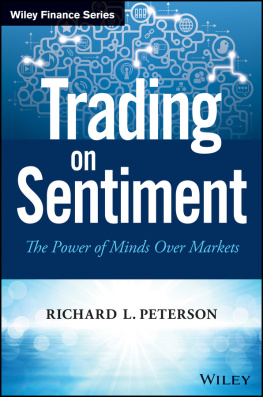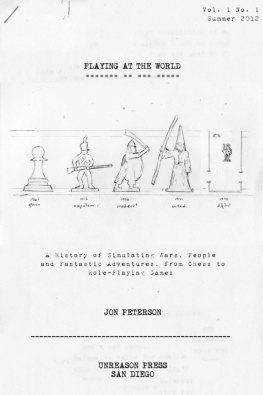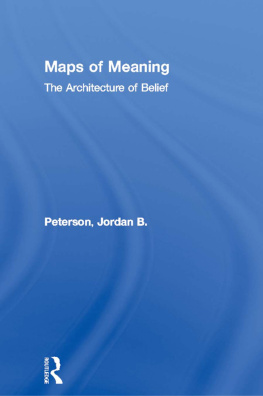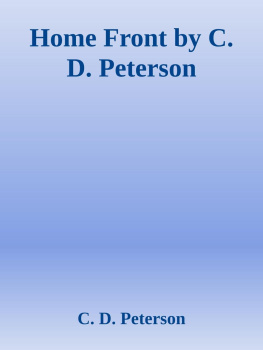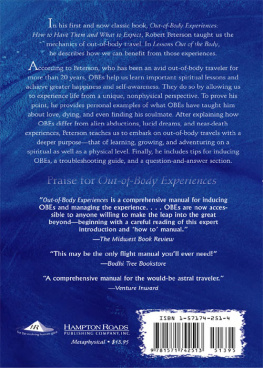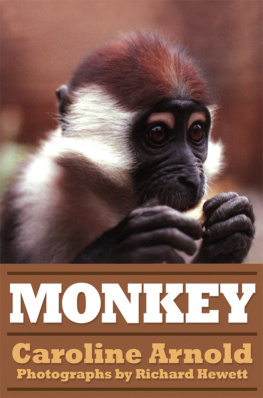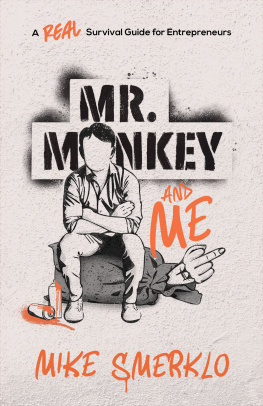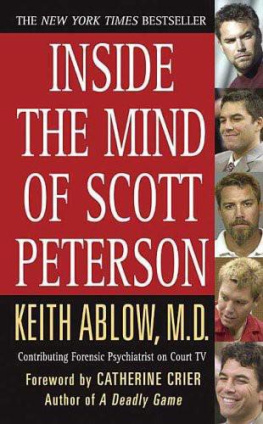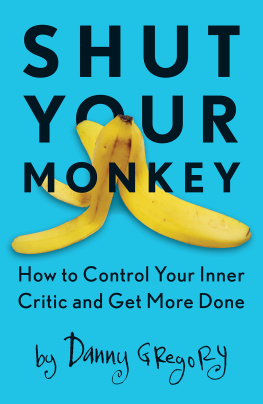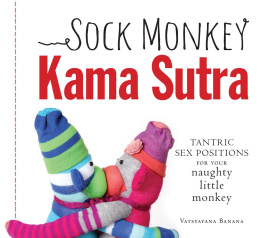Peterson - Monkey Trouble
Here you can read online Peterson - Monkey Trouble full text of the book (entire story) in english for free. Download pdf and epub, get meaning, cover and reviews about this ebook. year: 2018, publisher: Fordham University Press, genre: Romance novel. Description of the work, (preface) as well as reviews are available. Best literature library LitArk.com created for fans of good reading and offers a wide selection of genres:
Romance novel
Science fiction
Adventure
Detective
Science
History
Home and family
Prose
Art
Politics
Computer
Non-fiction
Religion
Business
Children
Humor
Choose a favorite category and find really read worthwhile books. Enjoy immersion in the world of imagination, feel the emotions of the characters or learn something new for yourself, make an fascinating discovery.

- Book:Monkey Trouble
- Author:
- Publisher:Fordham University Press
- Genre:
- Year:2018
- Rating:4 / 5
- Favourites:Add to favourites
- Your mark:
- 80
- 1
- 2
- 3
- 4
- 5
Monkey Trouble: summary, description and annotation
We offer to read an annotation, description, summary or preface (depends on what the author of the book "Monkey Trouble" wrote himself). If you haven't found the necessary information about the book — write in the comments, we will try to find it.
Monkey Trouble — read online for free the complete book (whole text) full work
Below is the text of the book, divided by pages. System saving the place of the last page read, allows you to conveniently read the book "Monkey Trouble" online for free, without having to search again every time where you left off. Put a bookmark, and you can go to the page where you finished reading at any time.
Font size:
Interval:
Bookmark:
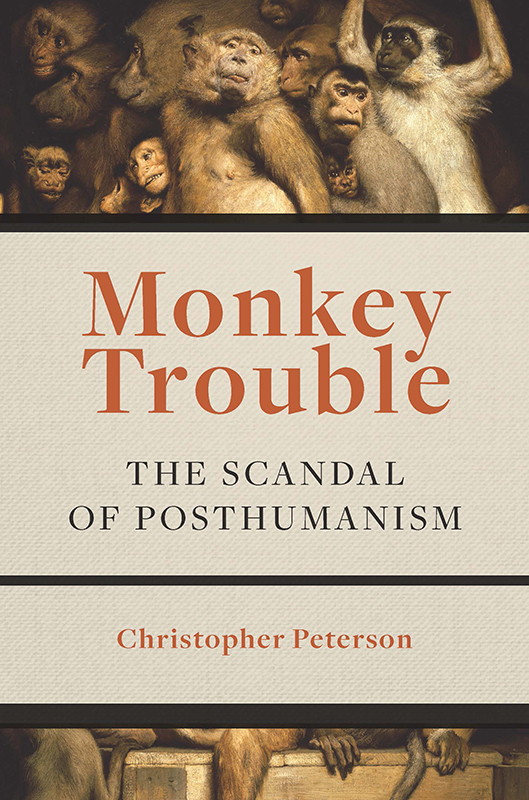
MONKEY TROUBLE
THE SCANDAL OF POSTHUMANISM
CHRISTOPHER PETERSON
FORDHAM UNIVERSITY PRESS
New York 2018
Copyright 2018 Fordham University Press
All rights reserved. No part of this publication may be reproduced, stored in a retrieval system, or transmitted in any form or by any meanselectronic, mechanical, photocopy, recording, or any otherexcept for brief quotations in printed reviews, without the prior permission of the publisher.
Fordham University Press has no responsibility for the persistence or accuracy of URLs for external or third-party Internet websites referred to in this publication and does not guarantee that any content on such websites is, or will remain, accurate or appropriate.
Fordham University Press also publishes its books in a variety of electronic formats. Some content that appears in print may not be available in electronic books.
Visit us online at www.fordhampress.com.
Library of Congress Cataloging-in-Publication Data available online at http://catalog.loc.gov.
Shh! Youll wake up that monkey.
JOE GILLIS in Sunset Boulevard (1950)
No, it was not freedom I wanted. Just a way out; to the right,
to the left, wherever; I made no other demands; even if the way out should only be a delusion; my demand was small, the delusion
would not be greater. To move, to move on!
FRANZ KAFKA, A Report to an Academy
The human is a source of trouble for posthumanism. Committed to disturbing the opposition between human and nonhuman, posthumanist theory has tended to sideline the human from the scene of its theoretical engagements with otherness. The human has become akin to the Invisible Gorilla made famous by psychologists Christopher Chabris and Daniel Simons. Seeking to establish the phenomenon of inattentional blindness, Chabris and Simons instructed participants in a psychological study to watch a video of people passing around a basketball. Many participants failed to notice a chest-pounding, ape-suited human walking through the middle of the scene. For those keen to demonstrate their fidelity to nonhumans, the human has likewise become a conspicuous blind spot.
To be sure, the nonhuman turn has yielded a wealth of critical interventions that have profitably altered the landscape of the humanities. Fostered by loosely federated areas of inquiry such as animal studies, systems theory, actor-network theory, object-oriented ontology, and speculative realism, this turn does not so much name a singular doctrine or movement as it does a broad theoretical reorientation that aims to shift our attention toward a concern for nonhuman alterity. Thanks largely to the insights of contemporary theory, humanism Presaging contemporary critiques of human hubris by several decades, Singer called for the political inclusion of nonhuman animals on the basis of the same liberal-pluralist principles that fostered the civil rights and feminist movements. More recent efforts to include plants and things have sought to expand the sphere of inclusivity even further. Humanism has thus acquired as one of its contemporary connotations a speciesist insistence on the exceptionality of the human at the expense not only of nonhuman animals, but also of countless insensate and inorganic entities.
Human hubris undeniably spawns a general indifference to the myriad of nonhuman beings and entities that share our world. This insouciance in turn fosters a number of contemporary ills: factor farming and other forms of animal abuse, global warming, depletion of natural resources, species extinction, and so on. Although we have known since Darwin that we are also apes, and more recent research shows that we share the majority of our DNA with chimpanzees, our narcissism of minor differences endures. Could it be that humans need to believe in their exceptionality despite all evidence to the contrary? Consider, for instance, the double valence that the term Anthropocene affords. To what extent does embracing this vocabulary concede the deleterious effects that humans have wrought on the environment as well as provide a form of ironic consolation? Perhaps we have utterly screwed up the planet, we tell ourselves, but at least we can take credit for it! The human thus reasserts its power in the same stroke as it reproves itself.
Does what we call the human retain any sense outside the discourse of anthropocentrism? Or is the human indistinguishable from what Giorgio Agamben calls the anthropological machine, which distinguishes human and animal within the human itself? According to Agamben, the modern post-Darwinian version of this machine operates by animalizing the human. The human is irreducible to biology because it is overlain with countless discursive mechanisms through which it reproduces its own image.
Broadly speaking, posthumanist critiques of exceptionalism challenge the presumption that animals lack a number of allegedly unique human capacities, such as language, tool-use, reason, imagination, a temporal sense, and awareness of mortality. Posthumanism has also alerted our attention to how species difference does not exclusively function as a figure for some other category, such as gender, sexuality, race, ethnicity, and class.or rather the persistence of its phantasmin our enthusiasm to mark a decisive turn toward the nonhuman?
Edmund Husserl observes that the earth does not move insofar as it functions as the ground body for our perception of other astronomical bodies. The earth may not be the center of the universe as such, but we experience it as if it were. This book argues that the human is likewise quasi-immobile insofar as it conditions all attempts to think what is other to it. An originary detour through the humanan irreducible antehumanismrenders possible any ethical and political reorientation toward the nonhuman. To claim that the nonhuman turn is irreducibly humanist is not to say that it is exclusively human, as if animals, plants, and things are simply passive objects to whom we are giving a voice. Antehumanism is not the antehuman, or even worse, the archehuman: it does not name an essential humanness that emerges prior to our co-constitution in relation to nonhumans. Antehumanism thus differs from human exceptionalism, which rests on a dialectic of possession and dispossession that jealousy guards human ownership of various self-certified abilities.
Antehumanism also contrasts with anthropomorphism, which is often disparaged for uncritically projecting human qualities onto nonhumans. The objection to anthropomorphism presupposes that the characteristics one attributes to nonhumans are proper to the human. The accusation thus fails to recognize how the human self-anthropomorphizes by giving itself this or that capacity whose declared absence among nonhumans performatively delineates the contours of the human. In response to the charge of anthropomorphism, some theorists have eagerly embraced it. Jane Bennett, for instance, sings anthropomorphisms virtues, while Brian Massumi describes the allegation of anthropomorphism as a risk that must be assumed. Anthropomorphism can impute human power to nonhumans only by first crediting this power to humans as such. To defend oneself against the charge of anthropomorphism by insisting that nonhumans and humans alike bear a capacity for agency thus does nothing to weaken the exceptionalist, sovereign fantasies through which our conception of the human is irremediably filtered.
Font size:
Interval:
Bookmark:
Similar books «Monkey Trouble»
Look at similar books to Monkey Trouble. We have selected literature similar in name and meaning in the hope of providing readers with more options to find new, interesting, not yet read works.
Discussion, reviews of the book Monkey Trouble and just readers' own opinions. Leave your comments, write what you think about the work, its meaning or the main characters. Specify what exactly you liked and what you didn't like, and why you think so.


